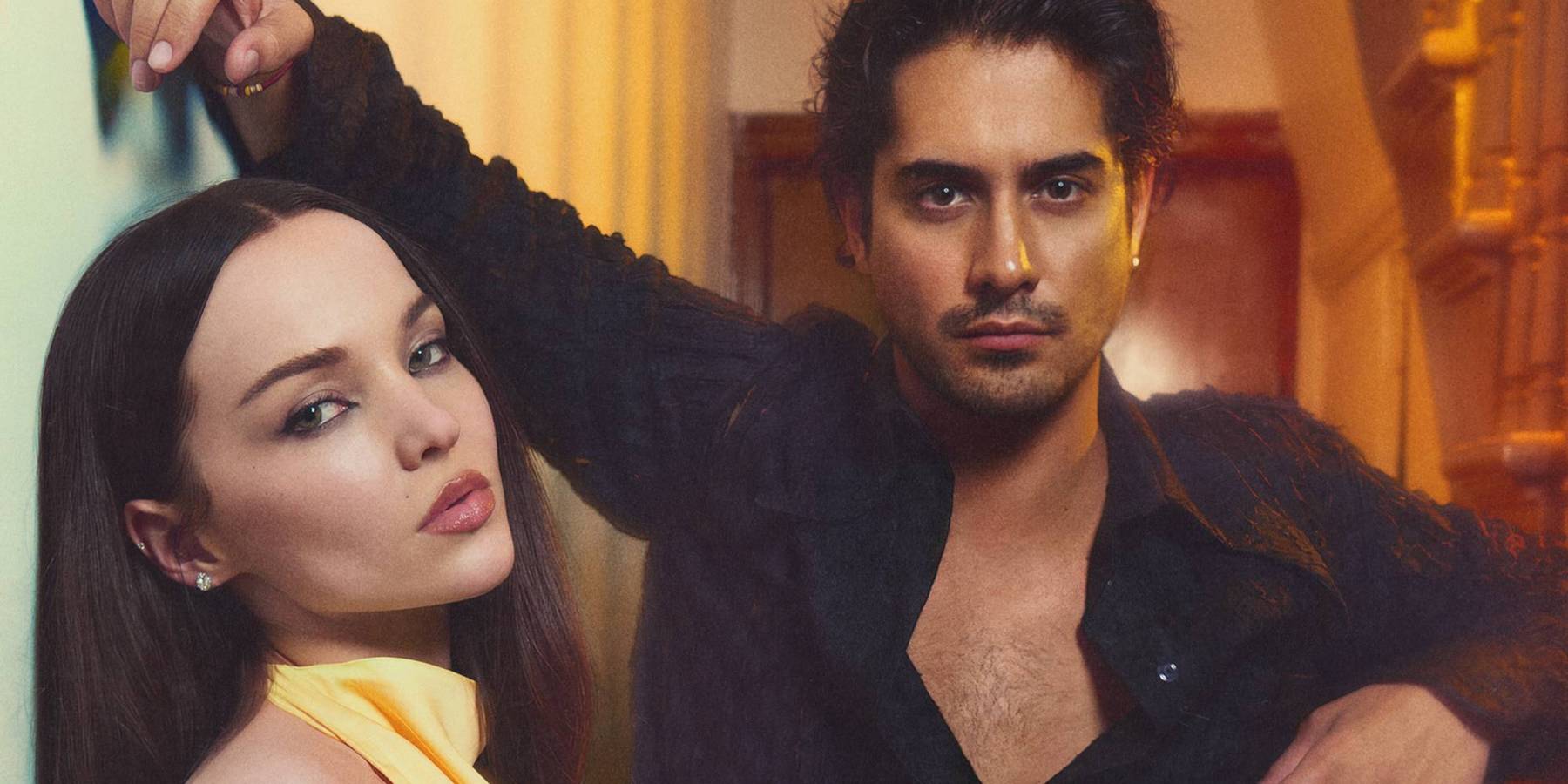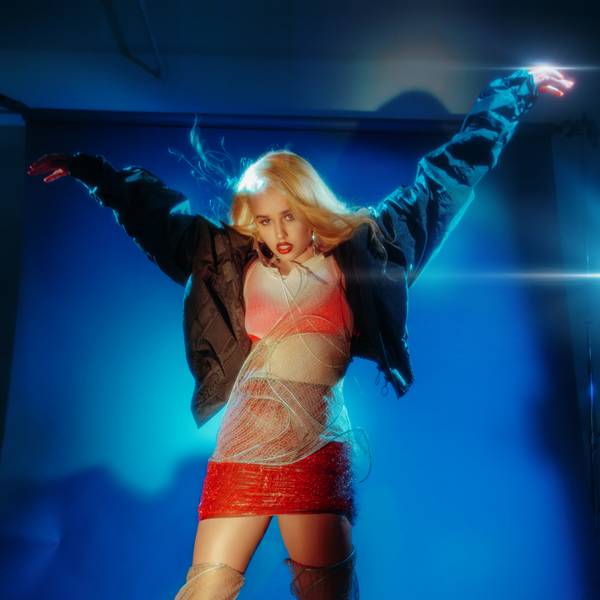
Tommy Genesis Is Not Interested In Being Your Freakshow
Story by Jael Goldfine / Photography by Charlotte Rutherford
Nov 08, 2018
Tommy Genesis is the kind of artist who breeds quippy headlines. She's a "fetish rapper" rebelliously waging war on taboo and respectability politics. She's a sex object of her own making, turning the male gaze on its heads, and making female desire and pleasure public. She's a theory-reading, manga-loving nerd-hipster-rapper "child of the Internet"-"art hoe" whose music, fashion and public presence skewers the millennial perspective. She's the protégé of Atlanta rap collective Awful Records (Father, Playboy Carti, iLoveMakonnen). And of course, the Swedish-Tamil Canadian rapper is the next M.I.A.
These narratives might all be true. She is affiliated with Awful (though she never "signed" with them). Her first EP World Vision and her videos like the bathtub-shot visual for "Tommy" are loaded with unapologetic sexuality and a celebration of pleasure (though Genesis wants to point out that her sex-positivity probably isn't all that shocking to younger generations). She and M.I.A have indeed worked together.
Some of these stories, Genesis even started, like the "fetish rapper" terminology, although she says the "genre" is just something she ad-libbed once in an interview, and people ran with it because it sounded good. Others, like that her music is defined by Internet culture (although she has lots of thoughts about it) have grown around her mostly unfed.
Genesis is unapologetic about her work, but wary of sticky soundbites overshadowing her creations. Because her easily sensationalized provocation was never an end unto itself, but simply a byproduct of her vision: "I'm not putting it on as a show," she said. "I'm not doing it for a reaction. I'm not going against someone else's opinion, and that's what I think rebellion is. I'm just going with my own opinion."
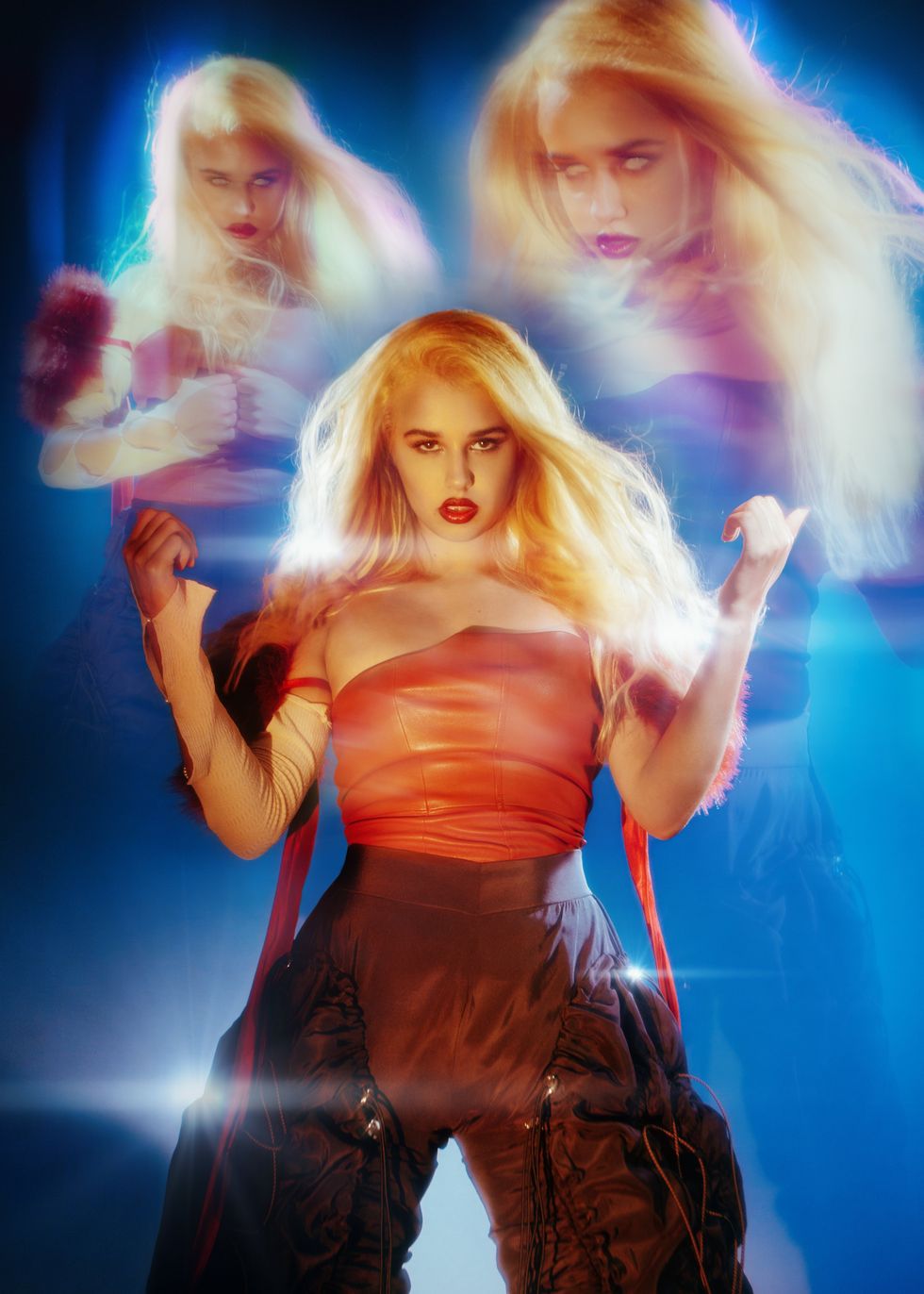
Top: AREA, Pants: Madeleine Hogan
Even if the political accolades and quirky genres she's been slapped with have truth to them, Genesis' new self-titled album, out now, reflects that she refuses to be limited to them. While her first full album is stocked with the sultry, incorrigible big-bass club songs we've come to expect from her like "100 Bad" ft. Charli XCX and "Bad Boy," replete with fire-alarm synths, sex groans, sinister beats (courtesy of Charlie Heat) and plenty of flexes about her pleasure and prowess, all captured in her signature nonchalant flow, Tommy Genesis has another side.
Seemingly vulnerable, pop-leaning tracks that defy her hard edge — and see her singing well as rapping — capture the middle of the album. At her release show, she says she hopes these songs will be listened to by "girls in the bathtub." On "You Know Me," she celebrates putting friends over dudes: "I don't know/ What I would do without my best friends." She's tenderly lost on "Naughty," which glows bright with Empress Of's touch, all about moving on from a boy who's "full of shit," while"Drive" is a mournful, escapist ballad that twangs with country-pop guitar.
On her embrace of pop, Genesis wants people to know that it had nothing to do with marketability or Downtown Records, her new label. She emphasizes that she is the auteur of her projects from the concept to the sound, and warns that, just like with the myths that swirl around her, no one should get too comfortable.
"It's just how this album came out," she said. "I don't think it means I won't make experimental rap again. That album is what it is and I love it, but it doesn't dictate all my further music. It doesn't mean that I've suddenly gone pop or that I've suddenly gone this way. I will always make the music that is right for me in that time and is a good representation of where I am."
PAPER spoke with Genesis about art school pretension, being 100% in control, and her apathy about labels.
How do you think going to art school informed your perspective?
Art school taught me how to think critically about art — which doesn't always matter or translate into music. I feel like there's two ways to make art. You either are aware of all the theories and the references that you're making, and you know of the histories and you know what you're doing in that sense. Or, you sort of just sit down with the canvas, and you throw paint at it, or you just draw what you're feeling. So for me, when I'm making art, these are things that I think about. Whereas, when I'm making a song — for me that's a lot like just throwing paint on a canvas. I'm not thinking about what I'm referencing. But if I'm making a video, a music video, I think about these things, I think about the references, I think conceptually, what does it mean, where does it go from here, what does it reference before, when someone sees this.
You know what... it wasn't really school, I was actually a really bad student. Even though I didn't get bad grades, I just didn't always go to school, I was always making shit, my teachers love-hated me, I almost got expelled, I was a bad kid even in university. With art school, it's a strange thing where they want you to be rebellious and they want you to be an artist, but then they don't. Only in the ways they want you to be. So I had a lot of teachers that loved me and a lot of teachers that hated me.
So what you learned in art school affects your visual art more than your music?
Honestly... I don't really like to talk about art school because I don't think it's necessary to be an artist. Art is something for everyone. That's one thing I hate about art school, at least when I was in art school, they teach you this really pretentious ideology of it only belonging to artists. Or at least at a conceptual art school, that's how it was. It was like, if you don't know what you're referencing, if you can't walk into the gallery and understand this sculpture because of what it means, you fail, or whatever. And I think that's bullshit. For me, even though I understand all these things, I don't really like to think about it or talk about it.
That makes sense.
I don't want kids to feel like they have to go to art school to make art, you know what I mean? You can read the same books I read in school. You don't have to go to school to read those books.
"I feel free to be myself, and I also am learning about how to do it the best way."
Do you ever imagine a version of your life where you pursued visual art, or fashion, or modeling rather than music?
I didn't try to make music as an actual career, I just was doing it. And it was the one that became, I don't want to say lucrative, but it's the one that popped off. You can sell your drawings and you can sell your art, but I get really attached to the things I make, I hoard all my creations, so with music, the cool thing about it is I can share it without it being one copy. For me, it was always just easier to share.
But I'm really involved in every part of it. I do my own vision. I edit and direct my videos. Even though it's music, I'm always doing other things. I spend a lot of time just designing and editing, so it doesn't always just feel like I'm a musician, I'm always doing it myself, and it's really time consuming but it allows me to be really close to the finished product and not have anyone else's sway to it.
It's one thing I always try to explain, especially with videos like the "Tommy" video. I'm naked in the bathtub, but nobody told me to be naked in a bathtub. Nobody directed it but me. Nobody edited the footage but me. It was a closed set. So it's not like there was some guy or somebody telling me what to do with my body, or how to do it, or that it was their idea. I think that allowed me to be really comfortable in my visuals, because I know not only can I decide what I'm wearing, how my makeup is, how my hair is, what I'm saying, what the beat sounds like, but I can also choose the footage. I feel free to be myself, and I also am learning about how to do it the best way.
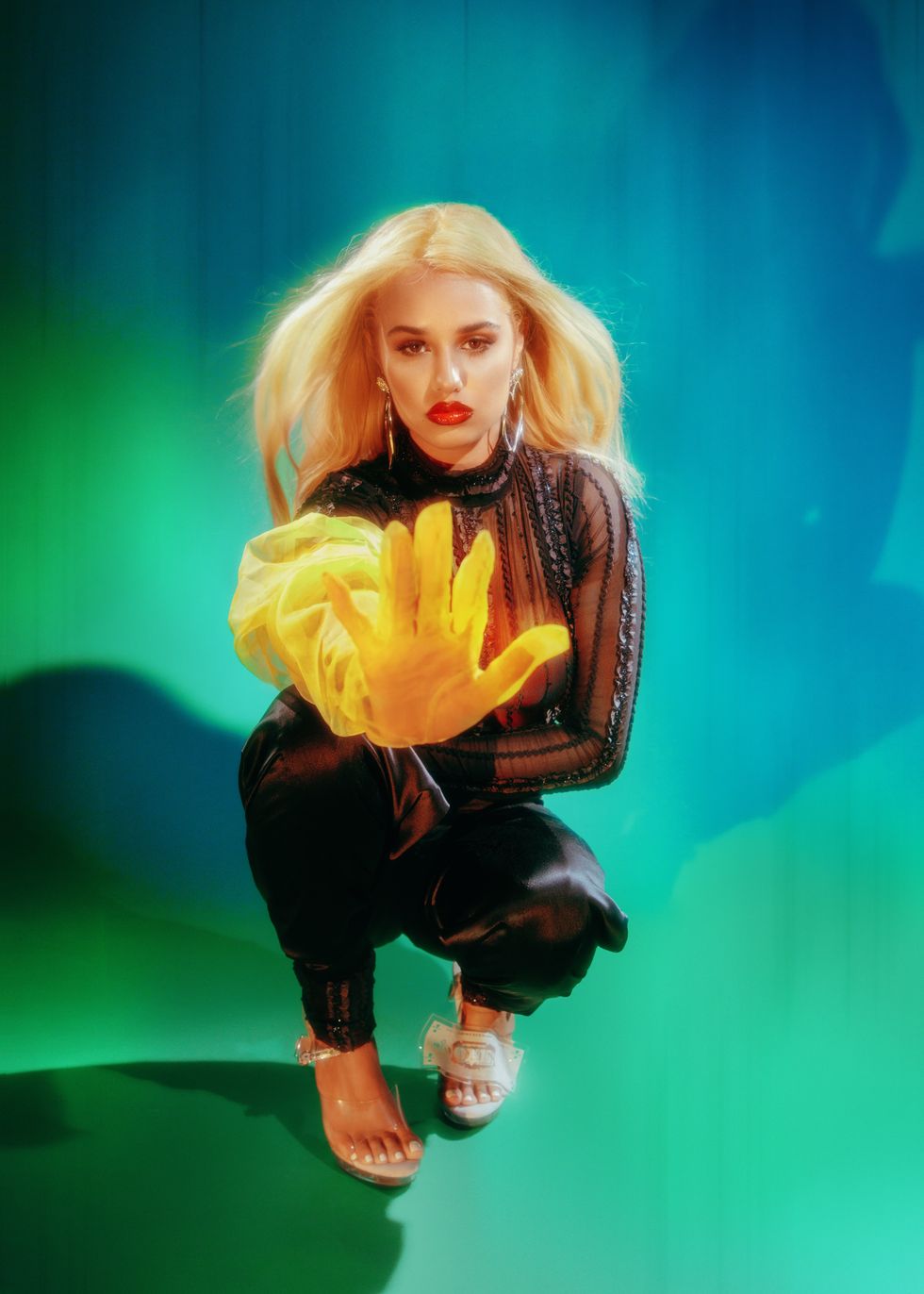
Jumpsuit: Carolina Sarria, Pants & Gloves: Madeleine Hogan, Earrings: Jiwinaia, Heels: Kota Okuda
So having control is a crucial part of taking those kind of risks?
I'm not good with people telling me what to do. I don't know why, it's something probably from my childhood. But I am not good if someone tells me what to do. I immediately feel uncomfortable and angry. I'll be at shoots where everyone is so nice, and I'm so happy to be there, and someone will tell me what to wear, and I'll say no. And then they'll try to get me to wear it, and I'll have to just contain this wild feeling inside of me, because I don't like to be told what to do. I know that even if they tell you it's okay, you'll have control over the finished product, you never do.
I think it's terrifying as a female in the industry to have someone else in control of your image, because it's so important to other people, other girls, other kids watching, just so they know they don't need anyone else to tell them how to be themselves. If you have a vision, if you have something you want to make, you can follow it through to fruition, to the end, and finish it on your own and on your own terms, and it's such an empowering feeling. But at the same time, I've sort of learned how to collaborate, and how to slowly open up. Because I'm so OCD, it's important to open up my artistic practice, and take advice, and take input, because that helps me grow. That's something I've definitely learned is important to do, but it's just you do it with the right people. You do it with people you're comfortable with.
A lot of the conversation around your work has focused on its sexual politics. But you've been adamant that it isn't a gimmick. What are your frustrations with that narrative?
I never use those words. I don't say feminism in interviews. I don't say sexuality. And for me, I am a watered-down version of myself in all these situations. I just think I can't control how people react to me, and it's always been that way. Since I was young, people would always be shocked at the things I would make, and I've just gotten numb to that reaction, because I'm not putting it on as a show. It's just who I am and how it comes across when I do it myself. I don't think I'm rebellious, because I'm not doing it for a reaction. I'm not going against someone else's opinion, and I think that's what rebellion is. I'm just going with my own opinion. I wasn't like, "Okay, well, you're doing it this way, fuck you, I'm gonna do it this way because you did it that way." That's not who I am. It's, "I'm doing it this way, because this is who I am and this is what I am." So for me, I don't view it as rebellion, I just view it as me.
I think it's just a box you get put into. I used to hate boxes, but now I just don't care. People say, "Oh, once you're in that box, you can't get out of it," and I don't think that's true. Nowadays, kids themselves aren't sheltered. They're online, they're seeing all these things, they're doing all these things. They're not going to be shocked by me. I think maybe the people shocked by me are of a different generation, because what I'm doing really isn't that shocking. It's not. Maybe I'm brave, but I don't think I'm shocking. Because I'll do things that maybe someone else wouldn't do, but there is also other people doing it. I fight those words sometimes, but honestly, at this point, it doesn't really matter to me how you describe it. Because also, you can't control what other people say or think of you, you really can't. And the minute you say, "I'm not this," you just draw attention to it. People will just do and say what they want about you, and it's their own subjective opinion. Someone can say, "Her music is like this," or, "She's like this," and that's their own opinion. Maybe I have never felt that way in my life, or I've never thought of those words when describing myself, but I can't control the way you think about me. So I don't really know how else to answer the question. I'm not frustrated, I'm just myself.
"I don't think I'm rebellious, because I'm not doing it for a reaction. I'm not going against someone else's opinion, and I think that's what rebellion is. I'm just going with my own opinion."
Do you still feel comfortable with the "fetish rapper" terminology?
I feel like with the whole fetish rapper thing, it was just something — I've talked about it so much — but obviously it's something that stuck, but I just made it up, so. It's not that deep. It's just not that deep. I think someone said to me, "You make this type of rap," and I'm like, "No, I don't, I make fetish rap." I literally made the term up. It was like years ago. And then ever since that people ran with it just because it was a new term.
You're honestly doing journalists' work for us. You gave us this catchy term to use for your music so we didn't have to come up with one.
Exactly, and it's a good headline! So people will use it in the headline, and they'll repeat it. It's not that deep. I think if you listen to my music, especially if you listen to the new album, it is what it is. It just meant what you thought it meant, it wasn't deeper than that. I'm sure pretty I've said it was deeper in certain interviews just to fuck with someone, but it really isn't. It's just something I made up.
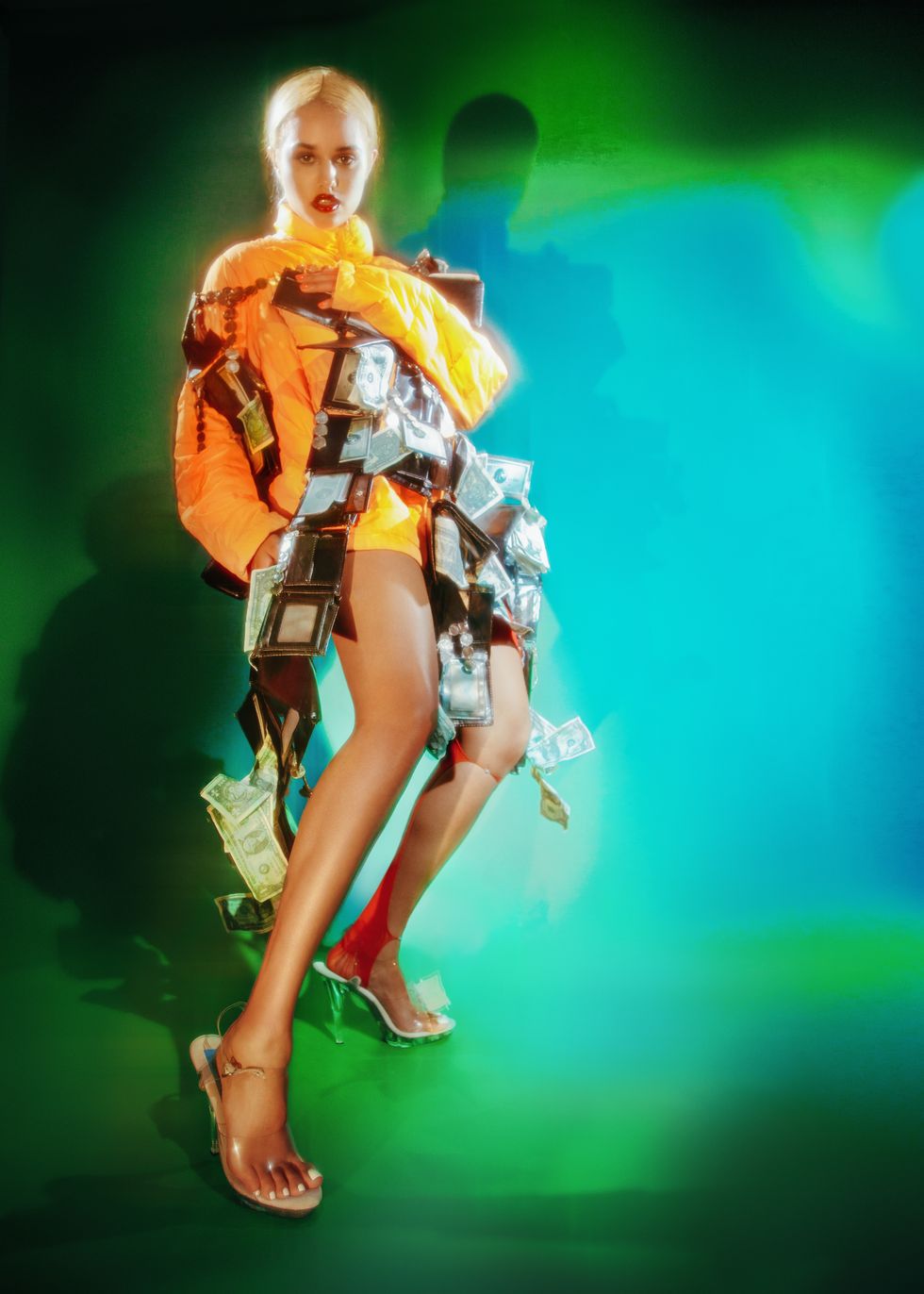
Puffer: Prada, Dress & Heels: Kota Okuda
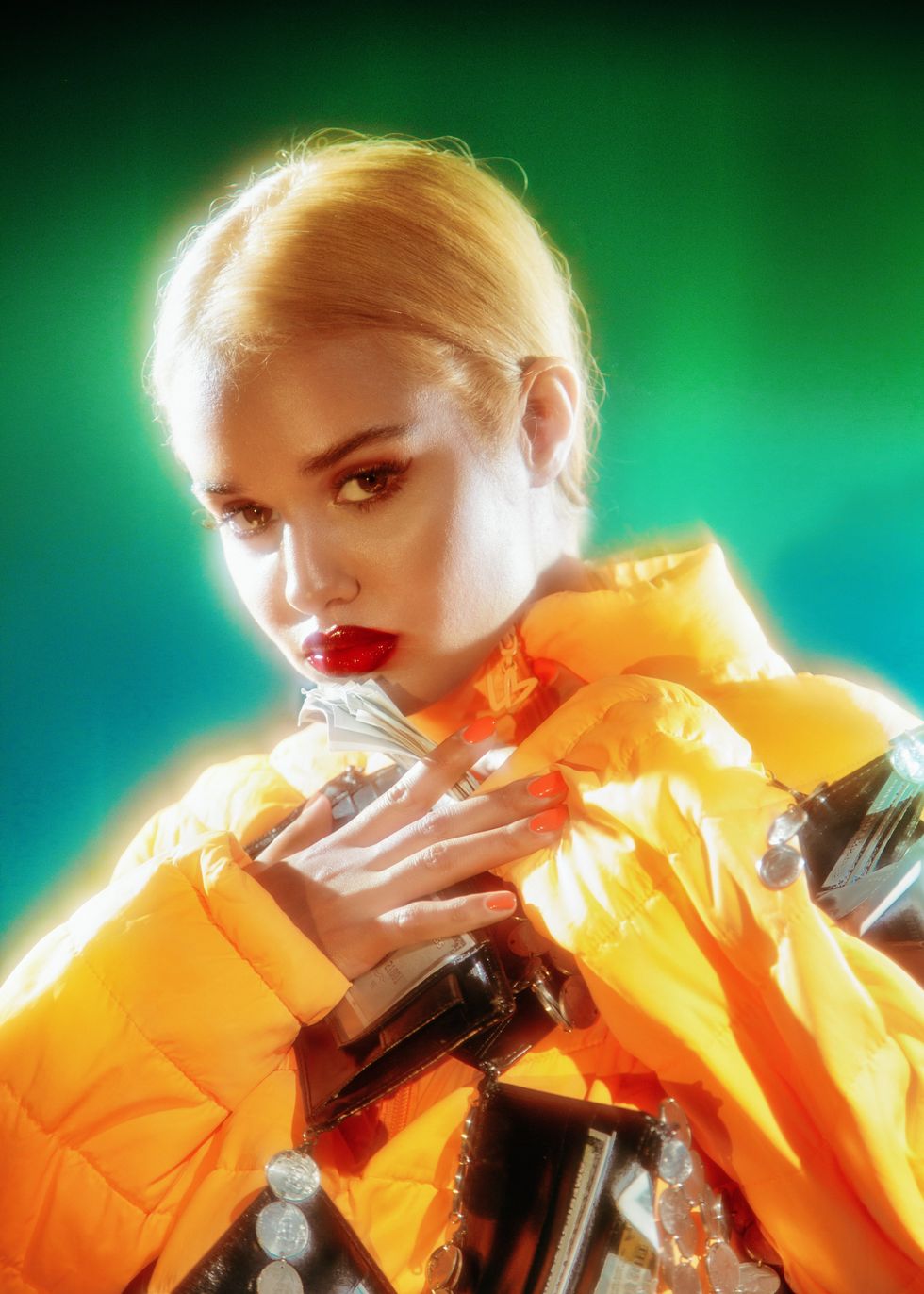
Puffer: Prada, Dress & Heels: Kota Okuda
What kind of internet culture influenced you growing up and what internet cultures you feel like you're a part of now?
I've had a lot of interviews where my words have been sort of twisted. And I've had a few interviews where a lot of things have been misquoted, that I haven't said that way. I had a really bad one recently, where there was a word in my quote, and I was like, "I know I didn't say this, because I need a thesaurus." But with Internet culture, I don't think I've ever said Internet culture, or Internet stuff, but I often get tied to it.
I do think the Internet is an open-ended platform, and it's sort of this crazy sci-fi network where anything is possible. I just view it as: if you are someone who wants to make something, it's the same platform for you as it is for me, and you can just go there and do what I've done or what someone else has done or what you want to do. It's important for people to know that the artists they like, or the art that they like, it's not limited to those people doing it. It's actually for everyone. I think if there's an Internet community, everyone is welcome.
Tell me about Tommy Genesis.
Part of this album felt more softer and more emotional than some of your older work. There were some romantic, heartbreak songs.
The irony is that I didn't have my heart broken. As an artist I'm very moody, and I'll get in the studio and just be feeling a type of way, and it won't even be something I can classify as a feeling, it'll just be like, "I'm feeling a little bit more vulnerable today, more emotional, or whatever." A lot of artists write differently. Certain artists will write from real life experiences, other artists will not even write their own music and just sing it, and other artists will write from fantasy and from utopian ideals or whatever made up stuff.
I feel like, for me, I really have one foot in personal experience, but my other foot is in this fantasy world. When someone's like "What were you feeling during the song? It seems like it's a really real experience." Or like, "You're really angry in this song." It's not that I actually have those experiences or not, it's just that I pull from things. It's like when you're acting or method acting. You have a role and it doesn't mean that role is exactly what you've been through, but in order to create something you pull from an experience, and for me, for a lot of the songs, I'll develop the track just as I write, or the way I say this sounds the best. It's not necessarily actually what's happening. It's a story. I'm telling a story. Yes, I'm the one telling the story and I'm pulling from my real emotions, but it's also not necessarily exactly my life.
"With this album, it was about deciding when to pull my walls down and when to put them up."
So it's not necessarily a super personal album.
I think with this album, it was about deciding when to pull my walls down and when to put them up. I always think about certain songs that I love. Certain songs that I hear that are so emotional and make me emotional, and they'll be an old school pop song or a new school pop song. I'll listen to it and I'll be like, "fuck." And I'll look it up, and I'll realize that the person singing it isn't the person who wrote it. And sometimes, it's this weird glitch. It makes me question music in general. For "Drive," I almost didn't keep that song for myself. I was like, "This song would be so good for someone who's pop/country. But, for the sake of the song, not even for me, does it deserve to be in someone else's hands because of the message?" The message is so, "I wanna get up in my car and drive. I have a feeling I don't feel alright."
Wow, it really is so country.
It's so country! But I kept it, because it was one of my first songs that I wrote like that. I always think about these things where you make something and it's just like making a painting. You put it in a gallery and someone walks by and sees this painting. They're going to be like, "This is what this painting means to me, so this must be what the artist is going through or what the artist meant." I'm just here to say that sometimes the art itself is in its own feelings, and its detached from the human. The human can be at home, all happy, but the painting can be sad as fuck. It exists forever in its world, in its own boundaries. It as either an object, or it as a song, or how its specific to the time its been put out, or how its specific to the community that hears it. it's always shifting and moving in its own world but I don't think it means that its directly a part of the artist. The way the industry — or whatever, I hate using that word — the way it works is people connect the music to you and they feel connected to you. It's an illusion, but it's also how you get people to fuck with you. Sometimes it's real and sometimes it's not.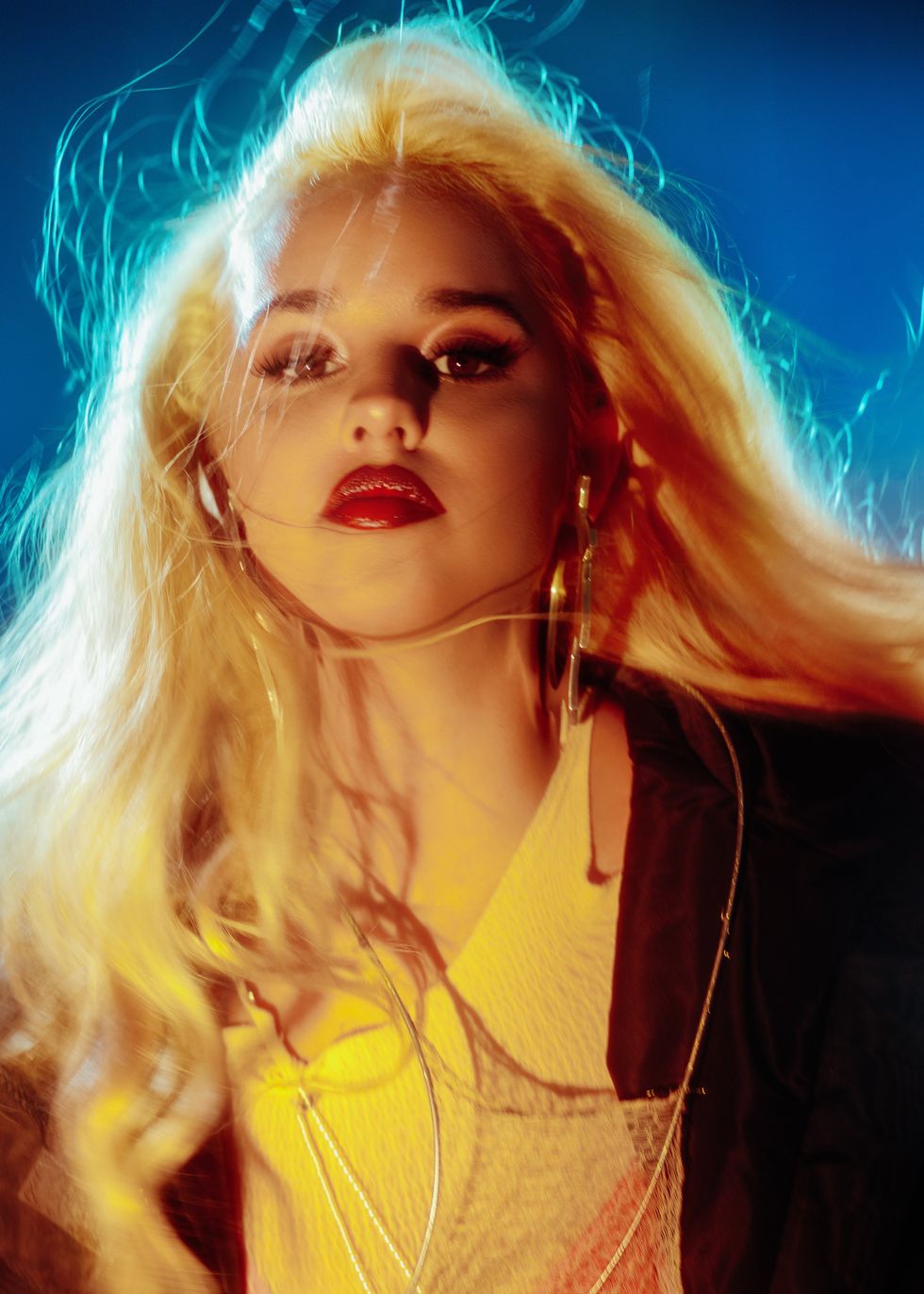
Top: Rui Zhou, Jacket: Madeleine Hogan, Earrings: Bond Hardware
I definitely had that same epiphany, realizing that these tender pop songs that make me feel so much were written by some old dude.
But it can be true, sometimes. Everyone does it different, right? I think it's important to be genuine, I wouldn't make something that would make me feel like I'm a fake person. I don't think that's what I'm trying to say. I'm just saying, as far as art goes, when someone asks you to talk about your art, it's almost just like, "I don't feel like talking about it because you go experience it." If you over-talk about music it's just not interesting to me. I have more interest in talking about art or process or things like that, as opposed to how I feel about music that I make.
Yeah, there's something weird about asking an artist "What's this album about?" Like, "I don't know, you listen to it!"
I'm conflicted because I still want to talk about it because I want people to have insight into it. But also my favorite music isn't music I've ever Googled reviews or interviews about. I've never looked up why Courtney Love made Hole's album Pretty on the Inside. I just blast that shit.
What was it like working with Downtown Records as opposed to Awful, and having more resources for this album?
I just want to clarify that I never signed to Awful. That's been misquoted. I just started making music with Father and with everyone else on Awful and I would go and hang out. They were just my friends. It was a creative collective. And then I think that Father turned it into a real label. They're really crucial to my development as an artist and some people I will always love, but I never signed.
With this album, working with Downtown, this was my first real album to me so there was a budget, there was a roll-out, there was a team behind it. That's the main difference. I had my own resources before, but this one's more just like, "Ok. Let's put out a concise project." Because, if I wasn't on a label, I would probably just be doing my own thing and randomly dropping songs. With this one, it was like, "Ok. Let's do this." And I got really excited about it, like, "Ok. I'm going to make a project. I'm going to make an album."
Musically, did working with an indie label like Downtown (Tei Shi, Mura Masa, Santigold, Chet Faker) impact you?
The shift musically is all internal, all within me. No one was like, "Do this." No one told me what to do, and it's the same with before. No one told me what to do. I'm not on a major label. I take advice, I take input, and I take peoples' opinions with a grain of salt and I'm open to it, but no one was like, "Shift this way. Do it this way." It was more me experimenting with different things I could do. Could I sing? Could I do this? It was just kind of me experimenting, and that's what came out of it.
"This album is its own world, and I zipped it up."
How did this record end up moving away from rap more towards pop and R&B?
I think it's just how this album came out. I think it's this album. I don't think it means I won't make experimental rap again. Honestly, the next project will definitely be more raw. This album is its own world, and I zipped it up. "Ok, you're done, I'm going to slap the cover on and walk away and I'm keeping moving." That album is what it is. I love it, but it doesn't dictate all my further music. It doesn't mean that I've suddenly gone pop or that I've suddenly gone this way. I will always make the music that is right for me in that time and is a good representation of where I was. A lot of these songs, some are new, some are written this year, but some are a year old. It's not actually where I am at right now, but that's kind of how the cycle works. You make it, you put it out, and then the stuff you're making now isn't out yet, obviously. It's definitely been a learning curve for me, because I used to just be able to make something and put it out that day. Hearing my shit mixed so well, or mastered, I'm just like, "Oh! This is crazy!" It's definitely a different process. I don't know if I like it, to be honest.
How do you feel about the release?
Once it's out, I'm going to probably feel excited, but until it's out, it's like this weird waiting time that feels like purgatory where you can't celebrate but you're also slightly stressed out by putting something so vulnerable into the world and just being like, "Hey guys! This is my art!" Also, it's just such a funny thing, all of this build up to putting out something that's just art. Or something that's just music. It's just music. I just know that if I wasn't doing music I would still be happy. I just get anxiety and I'm like, "Well whatever, it's just music." But then I get anxiety and I'm like, "Oh my god! It's coming out!"
So you're just ready to celebrate and move on?
Yeah, celebrate. Get it out, celebrate, move on.
Photography: Charlotte Rutherford (LMC Worldwide)
Styling: Jared Martell
Makeup & Hair: Celina Rodriguez
Producer: Luke Miley (LMC Worldwide)
Photo Assistant: Nate DeCarlo
Styling Assistant: Madeleine Shepherd
MORE ON PAPER
Entertainment
Dove Cameron and Avan Jogia Broke Their Molds
Photography by Gustavo Chams / Story by Joan Summers
Photography by Gustavo Chams / Story by Joan Summers
18 February
ATF Story
Madison Beer, Her Way
Photography by Davis Bates / Story by Alaska Riley
Photography by Davis Bates / Story by Alaska Riley
16 January
Entertainment
Cynthia Erivo in Full Bloom
Photography by David LaChapelle / Story by Joan Summers / Styling by Jason Bolden / Makeup by Joanna Simkim / Nails by Shea Osei
Photography by David LaChapelle / Story by Joan Summers / Styling by Jason Bolden / Makeup by Joanna Simkim / Nails by Shea Osei
01 December
Entertainment
Rami Malek Is Certifiably Unserious
Story by Joan Summers / Photography by Adam Powell
Story by Joan Summers / Photography by Adam Powell
14 November
Music
Janelle Monáe, HalloQueen
Story by Ivan Guzman / Photography by Pol Kurucz/ Styling by Alexandra Mandelkorn/ Hair by Nikki Nelms/ Makeup by Sasha Glasser/ Nails by Juan Alvear/ Set design by Krystall Schott
Story by Ivan Guzman / Photography by Pol Kurucz/ Styling by Alexandra Mandelkorn/ Hair by Nikki Nelms/ Makeup by Sasha Glasser/ Nails by Juan Alvear/ Set design by Krystall Schott
27 October
